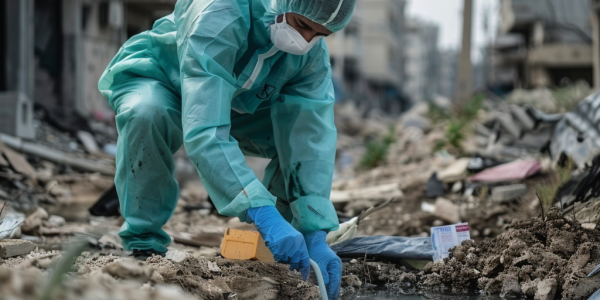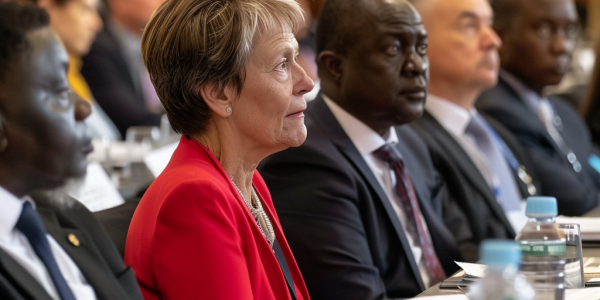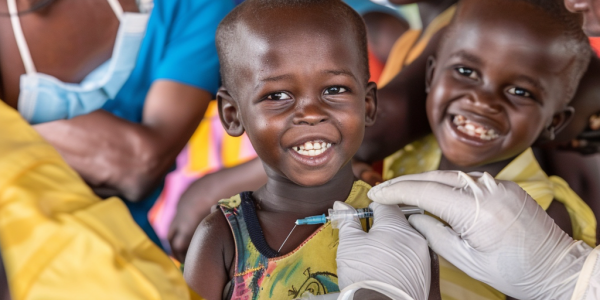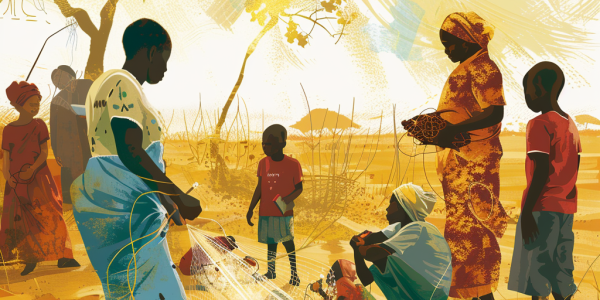Uganda Receives WHO Donation of Diagnostic Kits to Combat Mpox Outbreak
The Ugandan Ministry of Health has received a vital donation of mpox diagnostic kits valued at USD 15,135 from the World Health Organization and the Federal Republic of Germany. This support enhances Uganda’s capacity for timely testing and treatment amidst an ongoing mpox outbreak, which has reported 25 confirmed cases. Health officials emphasize the importance of these kits in controlling the virus’s spread and protecting public health.
New Initiative Launched to Accelerate mRNA Vaccine Development for Avian Influenza in Low-Income Countries
A new initiative by Sinergium Biotech aims to fast-track the development of mRNA vaccines for H5N1, enhancing accessibility for low- and middle-income countries (LMICs). Supported by WHO and MPP, this project focuses on empowering LMICs to boost their vaccine production capabilities, fostering global health equity and pandemic preparedness.
Polio Variant Detected in Gaza Sewage Amid Health Crisis
Recent findings confirm the detection of circulating vaccine-derived poliovirus (cVDPV) in Gaza sewage, raising public health concerns. Isolated from samples in Khan Younis and Deir al Balah, the virus is genetically linked to strains previously found in Egypt. While no paralysis cases have been reported, the WHO and local health authorities are enhancing surveillance and immunization efforts amidst a deteriorating healthcare situation in Gaza.
WHO Refutes Misinformation on Election Cancellations Amid Bird Flu Outbreak
The World Health Organization (WHO) has refuted false claims circulating on social media that it ordered the cancellation of elections due to a bird flu outbreak. Misleading information from The People’s Voice suggested urgent lockdowns and election halts, but WHO officials confirmed these assertions are entirely false. The organization emphasizes the need for enhanced surveillance and accurate public health communication amid ongoing misinformation challenges.
Global Rise in Insufficient Physical Activity Among Adults
A recent study reveals that insufficient physical activity among adults has been increasing globally from 2000 to 2022, with a prevalence of 31.3% in 2022. This trend poses risks for various health issues, highlighting the importance of promoting physical activity to improve overall health and well-being.
Australia’s First Human Case of H5N1 Bird Flu Confirmed in Child Who Traveled to India
The World Health Organization confirms Australia’s first human case of H5N1 bird flu in a child who traveled to India. The child recovered after treatment, with no close contacts showing symptoms. Precautions are advised to prevent the spread of avian influenza.
Man in Mexico Dies from H5N2 Bird Flu, No Immediate Public Risk
A 59-year-old man in Mexico has died from the H5N2 bird flu, a strain never before seen in humans. While there is no evidence of human-to-human transmission, health officials are closely monitoring the situation to prevent any potential outbreaks. Vigilance is key in combatting zoonotic diseases like bird flu.
Global Leaders Gather in London to Discuss One Health Approach to Climate Crisis
Learn about the recent groundbreaking event hosted by PATH and the Commonwealth in London, focusing on the One Health approach to address the critical intersection of human and planetary health in the face of climate change. Global leaders and experts gathered to emphasize the urgency of taking action to prevent epidemics and pandemics, especially affecting vulnerable populations. Keynote speakers highlighted the need for a coordinated One Health approach that considers the interconnectedness of human, animal, and environmental health in tackling climate change impacts.
Uganda to Switch to New Malaria Vaccine for Children Under Five
Uganda is set to abandon the use of the first malaria vaccine, RTS,S (Mosquirix), in favor of the recently approved R21/Matrix-M vaccine for the immunization of children under five years old. The decision comes after the Health Ministry Division of Malaria Control revealed the country’s plan to initiate malaria vaccinations for young children starting in October. Learn more about Uganda’s switch to the R21/Matrix-M vaccine and its implications for combating malaria in the region.
Urgent Need for Research on Climate Change Impact on Neglected Tropical Diseases and Malaria
New research underscores the urgent need for further investigation into the impact of climate change on neglected tropical diseases (NTDs) and malaria. Rising temperatures and shifting weather patterns are altering disease distribution, posing significant threats to public health. The study emphasizes the importance of collaborative modeling to predict the consequences of climate change on malaria and NTDs, warning of potential shifts in transmission patterns. Immediate action is required to safeguard progress in combating these diseases and address research biases that disproportionately impact vulnerable communities.










